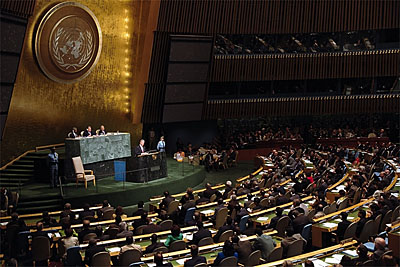Strict Construction
Here's a pretty old legacy post from the blog archives of Geekery Today; it was written about 21 years ago, in 2004, on the World Wide Web.

During the late unpleasantness, in spite of a sharply divided electorate and sharply worded debate, there was one point of agreement that you could always count on. To illustrate, here’s George Bush, trying to lay the smack down on Kerry:
When our country is in danger, it is not the job of the president to take an international poll; it’s to defend our country.
And here’s John Kerry doing his best to sidestep the smack down by insisting that he agrees with Bush on the principle:
What I said in the sentence preceding that was,
I will never cede America’s security to any institution or any other country.No one gets a veto over our security. No one.
Of course, Bush and Kerry disagree over something here: they disagree over what Kerry’s position is. But of course that disagreement reveals a fundamental agreement between the two: both of them accept the underlying premise that it would be absolutely damning for a Presidential candidate to tie decision-making about when and where the American military is deployed to another country or an international body. In fact, this is a point of political dogma repeated endlessly by almost everyone who has anything at all to say about the matter. Here’s William Saletan in Slate:
It’s clear from Kerry’s first sentence that the “global test” doesn’t prevent unilateral action to protect ourselves. But notice what else Kerry says. The test includes convincing “your countrymen” that your reasons are clear and sound.

And here’s Dick Cheney, direct as ever:
We heard Senator Kerry say the other night that there ought to be some kind of global test before U.S. troops are deployed preemptively to protect the United States. That’s part of a track record that goes back to the 1970s when he ran for Congress the first time and said troops should not be deployed without U.N. approval.
Now, I think that the Right is obviously wrong on the exegetical question of what Kerry actually said and believes, but I won’t belabor the point here (if you want it belabored, I suggest Roderick’s discussion at Austro-Athenian Empire). Let’s take it for granted that neither Bush nor Kerry would give another country a veto over American security policy, and move on to the critical question: do they have legitimate grounds for refusing to do so?
You’d take it from the way the debate has gone that it’s self-evident that they do: everyone in the droning classes seems to take it for granted that no sane governor could reasonably think that you ought to give other countries a veto over American security policy. Yet both Bush and Kerry were running for President–an office whose legal authority is supposed to derive from the Constitution of the United States. And the Constitution (which you swear to uphold when you become President) says, inter alia, that
This Constitution, and the laws of the United States which shall be made in pursuance thereof; and all treaties made, or which shall be made, under the authority of the United States, shall be the supreme law of the land; and the judges in every state shall be bound thereby, anything in the Constitution or laws of any State to the contrary notwithstanding. (Article VI, emphasis added)

One of those treaties made under the authority of the United States is the Charter of the United Nations, which was ratified by the United States government in 1945. If you accept the Constitution as legally binding, then you have to accept the provisions of the United Nations charter as legally binding; and among those provisions are:
Article 2
…
§ 2. All Members, in order to ensure to all of them the rights and benefits resulting from membership, shall fulfill in good faith the obligations assumed by them in accordance with the present Charter.
§ 3. All Members shall settle their international disputes by peaceful means in such a manner that international peace and security, and justice, are not endangered.
§ 4. All Members shall refrain in their international relations from the threat or use of force against the territorial integrity or political independence of any state, or in any other manner inconsistent with the Purposes of the United Nations.
…
Article 33
§ 1. The parties to any dispute, the continuance of which is likely to endanger the maintenance of international peace and security, shall, first of all, seek a solution by negotiation, enquiry, mediation, conciliation, arbitration, judicial settlement, resort to regional agencies or arrangements, or other peaceful means of their own choice.
§ 2. The Security Council shall, when it deems necessary, call upon the parties to settle their dispute by such means.
…
Article 39
The Security Council shall determine the existence of any threat to the peace, breach of the peace, or act of aggression and shall make recommendations, or decide what measures shall be taken in accordance with Articles 41 and 42, to maintain or restore international peace and security.
Article 40
In order to prevent an aggravation of the situation, the Security Council may, before making the recommendations or deciding upon the measures provided for in Article 39, call upon the parties concerned to comply with such provisional measures as it deems necessary or desirable. … The Security Council shall duly take account of failure to comply with such provisional measures.
Both Bush and Kerry claim to recognize the legal authority of the Constitution and the treaties made under it, including the U.N. Charter. But the plain text of the U.N. Charter gives other countries a veto over U.S. military policy, through the apparatus of the United Nations. Except in cases of actual invasion (which are exempted Article 51), the United States government cannot go to war without U.N. approval without violating the U.N Charter, and thus also the Constitution.
Now, as an anarchist, I don’t have a dog in this fight. I couldn’t care less about the United Nations: I’d argue that trusting a body constituted by the world’s heads of state and their representatives to protect international peace and human rights is about as wise as trusting a League of Foxes to guard the hen-house (and for precisely the same reasons). For that matter, I don’t recognize the legal authority of the Constitution and I don’t think that the pretenders to government office have any legitimate authority to ensnare the rest of us in legally binding treaties. But I do care about bad arguments. If there’s anyone who doesn’t agree with my peculiar views on the nature of legal authority, it’s John F. Kerry and George W. Bush; they claim to recognize the Constitution as legitimate and either one would swear to uphold it after being elected. If they really believe what they claim to believe about the law, then a decent sense of intellectual shame would demand that they either:
… accept other countries’ veto power over the United States’ decisions to go to war,
… move to formally withdraw the United States from the United Nations, or
… stop claiming that the Constitution is the basis for their legal authority
Something’s got to give; you can’t hold all the positions that John Kerry and George Bush loudly insisted that they hold without getting yourself stuck in a rank inconsistency. It may be too much to expect intellectual decency from politicians and political discourse. But if political discourse has lost its sense of shame, then the sooner it learns it again, the better. And someone has got to start the teaching, by example.
As the French might say, écrassez l’inf?@c3;a2;me.
The problem with your argument is of course that Article 51 has fairly flexible language. Let’s also note that “actual invasion” is not the requirement that Article 51 states, that’s a gloss you put on the terms that it does use (and which you conveniently avoided quoting).
Here, let me quote it for you:
Nothing in the present Charter shall impair the inherent right of individual or collective self-defence if an armed attack occurs against a Member of the United Nations, until the Security Council has taken measures necessary to maintain international peace and security.
Note that “armed attack” is the language used in the Charter, not “actual invasion.”
Many (if not most) legal theorists do not read this language as you do; they read it as part of the traditional powers any sovereign state has to repel an actual or immiment attack; indeed, let me be more forthright and declare them to be part of the inherent powers of a sovereign, and that they remain in place until the UNSC has dealt with an issue. SEE Euege Rostow, Until What? Enforcement Action or Collective Self-Defense, 85 Am. J. Intl. L. 506 (1991).
Furthermore, note that a resolution of the UNSC CANNOT justify military action by the U.S., since such would not include one of the constitutionally required branches for war declaring (be it “perfect” or “imperfect” war – see Bas v. Tingy (1804) and the philosophers Grotius, Pufendorf and Burlamaqui for an explanation of these terms)- that is the U.S. House (which was not involved – of course – in the ratification of the treaty creating the U.N. Charter). Indeed, this is one of the basic legal problems with the Korean War.
Of course there is also the fact that not a single Article 43 agreement has ever been signed; that is the primary means by which the UN would actually deal with an act of aggression.
Finally, in light of the UNSC resolutions on the matter, as well as the conditions of the cease-fire, its fairly clear that the U.S. and the U.K. had plenty of authority as far as the U.N. to recommence the war that was placed in limbo in 1991.
Gary:
I am not a legal scholar, nor I have to much knowledge on international law system. But considering how you present your argument, I have 2 problems with it..
1- you say.
But when was the United States attacked by Iraq?
2- you claim that: “Finally, in light of the UNSC resolutions on the matter, as well as the conditions of the cease-fire, its fairly clear that the U.S. and the U.K. had plenty of authority as far as the U.N. to recommence the war that was placed in limbo in 1991.”
How is this self-evident?
[formatting edited to make quoted text visible –The Management 2004-11-28]
My comments were directed to the terms of Article 51 generally. But note the following:
Iraqi ground batteries consistently attacked – though unsuccessfully – Coalition aircraft from the time of the ceasefire onwards.
The Iraqi government attempted to assasinate a former U.S. President.
and finally
I don’t believe that I used the term “self-evident,” but I did use the term “fairly clear.” Secondly, I think I was clear in my statement; taking together the UNSC resolutions on the matter, and the terms of the ceasefire, there was plenty of authority to attack Saddam’s government.
Gary
Ok. Point by point again
1- Yes, Iraqi anti aircraft batteries attacked US and UK planes, who ENTERED IN IRAQ’s air space without any permision and attacked iraq’s positions consistently. If anything, Iraq was defending itself, not attacking.
2-Is funny you mention the intention to assasinate US presidents. How many times the US has tried to assasinate foreign leaders, or worse, HAS assasinated them? Is that a cause for war? If it is, then US cities should be razed from the ground.
3- As far I can remember it was Israel who attacked first Iraq in the 80’s, with no previous alert to destroy an atomic reactor in its soil…isnt it?
3- ok. You didnt say “self evident”, but “fairly clair”. Still, how is fairly clair…can you actually elaborate?
Sergio:
Well, the US and UK claimed authority to enforce no-fly zones under the terms of UNSC Resolution 688. And that resolution does clearly determine a threat to international peace and security pursuant to Articles 2 and 39. I don’t think that their claims are actually justified–since 688 does not authorize military force pursuant to Articles 42-43. But that is what the immediate response to claims against the no-fly zone enforcement is going to be.
Gary:
This is true, but beyond the point. I’m not arguing that, given the legal obligations that both Bush and Kerry claim to accept, U.N. approval is sufficient for the United States to go to war other than in cases of direct defense against an attack; I’m only arguing that it’s necessary. Whether or not other bodies (such as the House of Representatives) also have veto authority over military commitments does not affect whether other countries (through the organs of the United Nations) also do.
This doesn’t make wars launched without approval pursuant to Article 43 any less legally dubious under the terms of the Charter–any more than the U.S. government’s willingness to go to war repeatedly without a single Congressional declaration of war since 1941 makes those wars less legally dubious. It just points to the well-known fact that the U.N. hasn’t done a very good job of making its members stick to the terms of the agreement.
(… And, in fact, Gary points out that it specifies self-defense against an “armed attack”, not against an invasion.)
Fair enough; I’ll cop to that. But I don’t think anything important turns on the distinction here. Let’s grant that there’s some fairly broad set of “armed attacks” that the United States government can legally (pursuant to the Constitution and the UN Charter that it ratified) defend itself against. The ipsissima verba of the Charter makes it absolutely clear that it (1) grants international bodies the authority to demand that members seek peaceful settlements to a dispute, (2) rules disregard for the demand as a violation of the treaty obligations (under Article II) accepted on ratifying the U.N. Charter, and (3) specifies that the legitimacy of police actions (i.e., measures taken against breaches of international peace other than self-defense against direct armed attack) are matters to be decided by the U.N. Security Council.
All of these passages are sufficient to establish that if you accept the authority of the Constitution–thus, all treaties ratified pursuant to its terms–then you must (afortiori) accept that international bodies have–in at least some situations–the legal authority of a veto over United States military action. This places both Kerry and Bush in the triple-bind that I outlined above.
Does any of this apply to the late unpleasantness in Iraq? Well, I think it clearly does–given the lack of any need for defense against an actual or imminent attack against the United States, and given the way in which Security Council members made it clear that they would not approve a resolution directly authorizing the use of force against Iraq. The Bush Administration’s legal hermeneutics notwithstanding, I think this makes the legal intent behind the standing resolutions clear enough.
That said, nothing much turns on whether or not Mr. Bush’s war was in violation of the U.N. Charter. As far as the actual political and moral judgment of the war goes, I think that principles of natural law decide the issue long before any questions about the compacts of tyrants ever come into play. And the question I’m interested in in this article–whether or not Mr. Bush and Mr. Kerry’s legal premises commit them to conceding veto authority over U.S. military policy to other countries–is independent of whether or not the analysis can be brought to bear in the case of the war against Iraq.